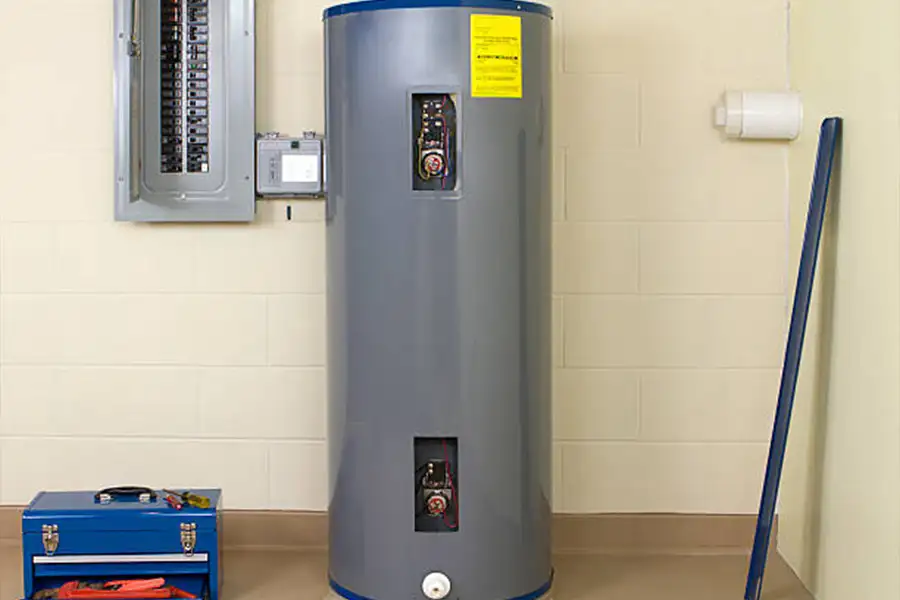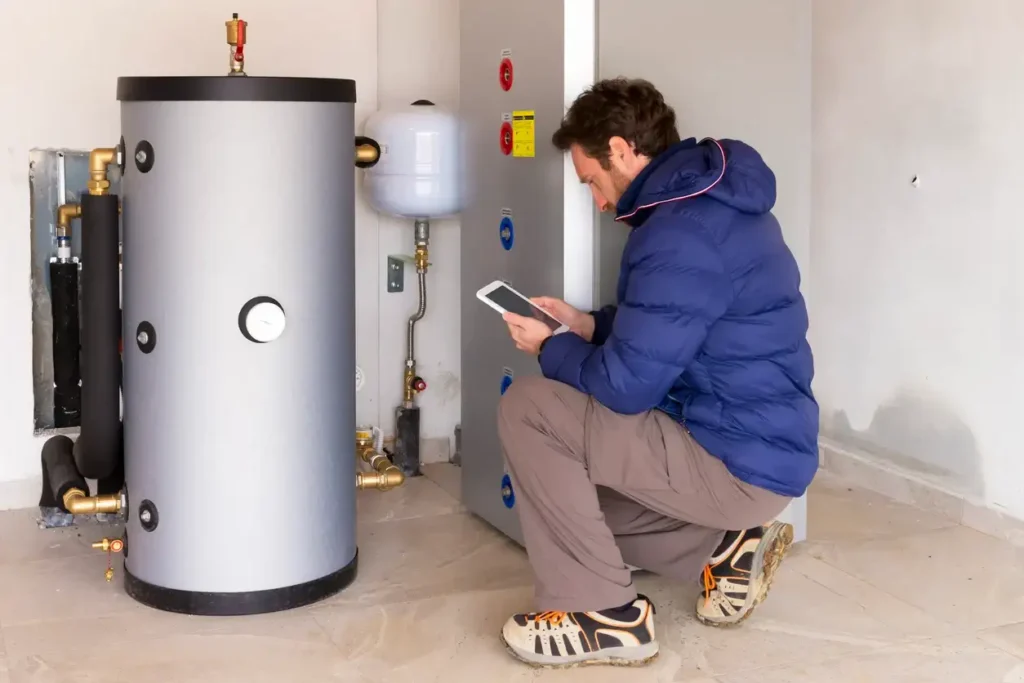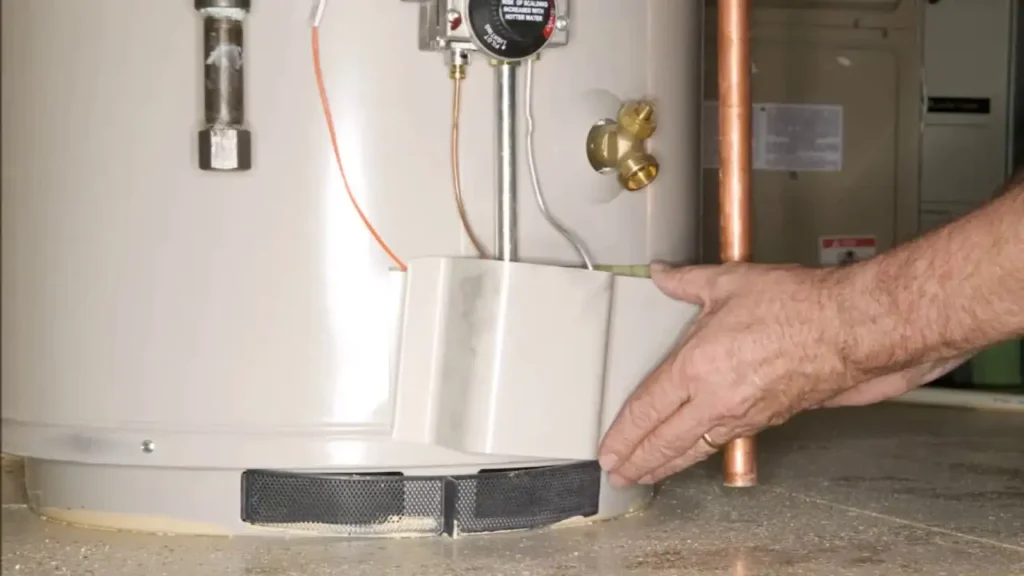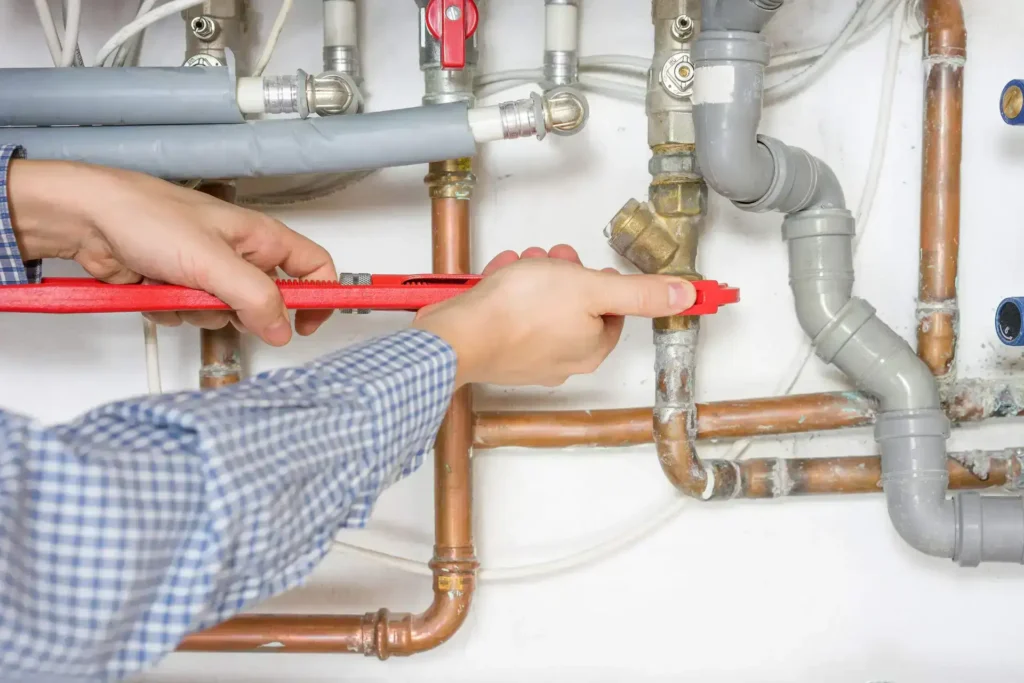When it’s time to replace your water heater, the cost is an essential factor to consider. The water heater replacement cost can vary depending on the type and size of the unit you choose. Other factors, like where you live and how complex the installation is, can also affect the final price.
Water heater replacement costs range between $874 and $1,765, with the national average around $1,293. It’s helpful to get quotes from different companies to compare prices. By understanding the cost, you can make a more informed decision when replacing your water heater.
Water Heater Replacement Cost Factors

Various factors determine the cost of replacing a water heating system. Understanding these essential elements can help you estimate the total cost of your replacement.
Type
Various kinds of water heaters exist with specific advantages and disadvantages. When choosing between heaters, the cost of your unit replacement may reach extreme levels. Standards for water heater kinds, descriptions, and typical installation expenses appear in the following table.
Type of Water Heater |
Description |
Average Cost to Install |
| Tank | A traditional water heater that stores hot water in a tank | $900–$2,500 |
| Tankless | Heats water on demand rather than storing it | $1,000–$3,500 |
| Gas | Heats water with propane or natural gas | $500–$2,500 |
| Electric | It uses a powered element to heat water | $500–$3,500 |
| High-Efficiency | Uses power more efficiently to reduce energy bills | $1,500–$3,000 |
| Indirect-Fired | Heats water with a coil for reduced maintenance and cost | $1,200–$3,500 |
| Hybrid Heat Pump | Uses geothermal energy to heat water | $1,200–$3,500 |
| Solar | Heats water using solar power from connected panels | $1,700–$5,500 |
Your home’s needs and budget determine which solar power system is best for you because these systems vary in efficiency, installation requirements, and future operational expenses.
Size
The size of your water heater system directly impacts your setup’s continency. People living in appliance-demanding, more prominent families should choose large or high-capacity tankless water heaters to meet their household needs. When selecting the right capacity, you avoid spending extra money on sizes that exceed your hot water requirements.
Tank Size (Gallons) |
Average Price Range |
| 30 | $550–$1,700 |
| 40 | $550–$2,000 |
| 50 | $700–$2,200 |
| 75 | $1,200–$3,400 |
| 80 | $1,300–$3,600 |
Fuel Type
The expense of a newly purchased water heater depends heavily on its fuel type and will increase significantly when your home requires additional infrastructure to power the unit. Basic models of electric water heaters, along with gas water heaters and propane heaters, all start at the same price range, which is approximately $600. The highest-priced electric water heater can reach up to $3500 before installation and necessary electrical work are considered.
Installing propane or natural gas water heaters requires considerable upfront investment, which becomes even more expensive when establishing gas utility lines throughout your home. The total installation cost may rise when users switch to gas or different fuels because they need new infrastructure. Choosing a new efficient water heater requires detailed cost analysis to determine eventual energy savings over time.
Energy Efficiency
An energy-efficient water heater provides a powerful opportunity to reduce monthly energy expenses. Energy efficiency savings over time can balance the initial cost of buying the unit. Quality-efficient units generally demand a more significant initial investment, particularly when you select solar or geothermal water heaters.
Essential high-efficiency electric water heaters start at $1,500, with bigger units priced between these two figures up to a maximum of $3,000. A solar water heater’s upfront expense reaches $5,500 yet delivers valuable ongoing energy savings. Take your budget into account during model selection, then analyze the extended financial benefits of efficiency.
Brand
Customer water heater pricing and product reliability depend on the consumer’s brand. Company reputation directly corresponds to product excellence, improved warranties, and better service assistance. Premium price levels often accompany brands that maintain high product quality.
Water Heater Brand |
Average Cost (Unit Only) |
| A. O. Smith | $400 to $3,500 |
| Bradford White | $400 to $3,000 |
| Kenmore | $350 to $1,000 |
| Rheem | $400 to $2,300 |
| Whirlpool | $350 to $1,500 |
Location
The cost of installing a water heater depends on the selected location. The installation duration extends, and expenses increase when the water heater is inaccessible, resulting in placement in an attic or basement. The cost also rises when your residence needs plumbing and electrical system upgrades. Check the placement of your water heater during installation to prevent future costs.
Labor and Permits

Standard water heater installation through professional labor costs between $150 and $450. Replacing a tank system with tankless technology approximates a cost estimation of $2,500. The cost of professional services varies depending on whether you hire a plumber or electrician because plumbers charge $45 to $200 per hour, and electricians cost between $50 and $100 per hour.
Because of unit type considerations, replacing water heaters requires permits that cost $25-$300. Homeowners can manage their replacement licenses or select a contractor to acquire and administer these permits for a supplemental fee—the permit—to install a new natural gas line costs between $50 and $300.
Fuel Type
Electric water heaters need no venting system because they produce no exhaust. Water heaters that use propane or natural gas need access to direct venting or require power ventilation systems. Power venting, which utilizes a fan-operated exhaust system, costs homeowners between $600 and $1,100 for the complete system with electrical installation charges.
Replacement
Water heater replacement often requires uninstalling the prior unit before installing the new one. The cost of removal, which ranges from $100 to $500, must be added to the new unit prices for the entire process. The total expenses include both removal costs and professional labor. Customers do not incur extra costs when they select a new unit of identical dimensions and components.
Cost Estimates for 15 U.S. Cities
The following table summarizes the average costs of water heater replacement in 15 major U.S. cities:
City |
Average Replacement Cost |
| Austin, TX | $1,300 |
| Chicago, IL | $1,600 |
| Dallas, TX | $1,400 |
| Houston, TX | $1,300 |
| Los Angeles, CA | $1,900 |
| New York, NY | $1,800 |
| Philadelphia, PA | $1,500 |
| Phoenix, AZ | $1,300 |
| San Antonio, TX | $1,100 |
| San Diego, CA | $1,900 |
| Cleveland, OH | $1,165 |
| Indianapolis, IN | $1,500 |
| Denver, CO | $1,800 |
| Portland, OR | $1,675 |
| Charlotte, NC | $1,375 |
For more details on the cost related to gas line installation, check this guide.
Cost to convert from electric to gas water heater.
Converting from electricity to natural gas water heating requires an investment between $400 and $2,000 and possibly additional costs based on gas line accessibility. Replace your electrical water heater with a gas system when you need extra hot water or want better energy efficiency while facing recurring power disruptions.
Changing from gas to electric water heating systems requires between $250 and $1,000+, primarily for establishing new wiring and circuit installation. Residential homeowners choose this solution to decrease their environmental footprint but mainly use renewable energy systems such as solar or wind power.
Water Heater Replacement vs. Repair

You should examine specific elements to determine whether your water heater needs fixing or replacing. Here’s a breakdown to help guide your decision:
When to Repair Your Water Heater
Repairs are usually the most cost-effective option when:
- The unit is relatively new: Your existing water heater (up to 15 years for tankless models) or one that just turned 10 years old can still function for another decade. Replacing the entire unit with repair work typically costs less money.
- Minor Issues: You can avoid expensive replacement costs by spending less than $500 to resolve frequent water heater failures, such as thermostat faults, heating element issues, or a small leak.
- Specific Problems: To save money while improving heater lifespan, you should replace a single defective part, such as a gas valve, thermostat, or heating element. This costs less than a complete system replacement.
When to Replace Your Water Heater
Replacement may be necessary in these scenarios:
- Age of the Unit: A typical tank-style water heater operates between six and fifteen years, while tankless ones can function for twenty and beyond. The value of heater replacement surpasses repair costs when your unit surpasses its 10-year life span (specifically for tank-style models).
- Years sent Repairs: A water heater needs replacement when multiple parts repeatedly require repairs, indicating its life is ending.
- Efficiency Concerns: Water heaters that age beyond their decade are often less efficient, driving up residential utility bills. Upgrading to an energy-efficient system, such as a tankless water heater or high-efficiency tank heater, will decrease monthly utility bills. It will pay off in the long term, as you will save money.
- Serious Problems: Large-scale tank issues, such as leaks or extensive corrosion, frequently make repairs unaffordable or economically impractical. When serious problems occur, unit replacement is the sole resolution option.
Cost Comparison
- Repair Costs: The expense of minor maintenance, such as thermostat replacement and heating element repair, falls between $100 and $500 based on parts value and technician wages. Price tags for complete valve replacements or tank changes usually extend between $500 and $1,300.
- Replacement Costs: Consumers can expect to spend between $1,000 and $3,500 and higher amounts for water heater replacements depending on size and type, brand selection, and tricky installation demands. The total expense becomes higher when both plumbing services and electrical tasks need execution.
Other Considerations
- Energy Efficiency: Installing newer water heaters, particularly tankless systems, decreases long-term energy costs because they are more efficient.
- Warranty: The warranty on a new water heater protects you from maintenance costs if the system functions incorrectly during the initial warranty period.
- Environmental Impact: The newest water heater models incorporate environmentally friendly features that help decrease your carbon emissions.
Tank vs. Tankless Water Heater Costs
Tank water heaters have a low upfront price tag and simple installation methods. Tank water heaters typically range in price from $600 to $2,500, depending upon their brand and size. Twole repair costs stay affordable, ranging between $100 and $500. Tank water heaters operate at higher energy rates because they maintain sustained water heating during idle time.
Tankless water heaters start at $1,200 but could reach $3,500 before the addition of installation costs. Tankless water heaters preserve energy because they begin water heating procedures only during use. Repair costs for these systems run between $220 and $975. Tankless water heaters have a longer lifespan and endless hot water supply, so they function as beneficial long-term investments.
Budgeting for a Water Heater Replacement
Several practical methods exist to decrease the cost of water heater replacement operations. Here’s a summary of the key points:
- Repair vs. Replace: Fixing minor issues in your water heater is typically cheaper than replacing the entire unit. However, the expenses for sophisticated repairs differ from those for a total water heater exchange.
- Fuel Source: You should maintain your current fuel source for the new water heater to avoid paying extra fees to connect it to propane or natural gas fuel.
- Energy Efficiency vs. Upfront Costs Energy efficiency comparisons with initial model expenses can help you choose between new water heaters. An efficient, expensive system can provide cost savings through extended usage periods.
- Rebates and Incentives: Depending on your location, research available rebates from utility companies and local governments that offer incentives for installing energy-efficient water heating systems to reduce initial expenses.
- Insulation: Insulating your water tanks and pipes can reduce the energy your system uses. Improved energy retention means your system performs better, and your energy bills decrease.
Conclusion
Water heater replacement expenses fluctuate depending on your selection of different types, variations in size, and installation requirements. Choosing the right models and proper fuel choices can lead to budget savings. Energy savings over many years should influence your purchasing direction.
Research gives you access to different refund programs that help lower your initial expenses—not relying on personal installation but hiring a professional leads to appropriate setup measurements and safety precautions. Your water heater will benefit from planned periodic maintenance because it will prolong its lifespan while keeping maintenance costs affordable.
FAQS
Q1. What is the labor cost to install a new water heater?
The labor can cost anywhere between $500 and $1,000. It depends on the complexity of the installation.
Q2. How much does it cost to install a 50-gallon water heater?
A 50-gallon water heater runs from $800 to $2,500. This includes the unit and the installation.
Q3. How much does it cost to put in a 40-gallon water heater?
Depending on the type and brand, replacing a 40-gallon water heater costs $700 to $2,000.
Q4. How much does it cost to replace a water heater in California?
Replacements in California range between $1,000 and $3,000. The price becomes higher because of the higher labor rates.
Q5. How long does it take to replace a 40-gallon water heater?
The replacement of a 40-gallon water heater is accomplished in about 2 to 4 hours, depending on how complicated the task is.


